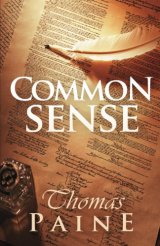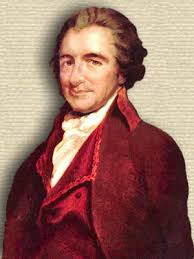Common Sense Page #6
Common Sense is a pamphlet written by Thomas Paine in 1775–1776 advocating independence from Great Britain to people in the Thirteen Colonies. Writing in clear and persuasive prose, Paine marshaled moral and political arguments to encourage common people in the Colonies to fight for egalitarian government.
Volumes have been written on the subject of the struggle between England and America. Men of all ranks have embarked in the controversy, from different motives, and with various designs; but all have been ineffectual, and the period of debate is closed. Arms, as the last resource, decide the contest; the appeal was the choice of the king, and the continent hath accepted the challenge. It hath been reported of the late Mr. Pelham (who tho' an able minister was not without his faults) that on his being attacked in the house of commons, on the score, that his measures were only of a temporary kind, replied "they will last my time." Should a thought so fatal and unmanly possess the colonies in the present contest, the name of ancestors will be remembered by future generations with detestation. The sun never shined on a cause of greater worth. 'Tis not the affair of a city, a country, a province, or a kingdom, but of a continent--of at least one eighth part of the habitable globe. 'Tis not the concern of a day, a year, or an age; posterity are virtually involved in the contest, and will be more or less affected, even to the end of time, by the proceedings now. Now is the seed time of continental union, faith and honor. The least fracture now will be like a name engraved with the point of a pin on the tender rind of a young oak; the wound will enlarge with the tree, and posterity read it in full grown characters. By referring the matter from argument to arms, a new æra for politics is struck; a new method of thinking hath arisen. All plans, proposals, &c. prior to the nineteenth of April, i.e. to the commencement of hostilities, are like the almanacks of the last year; which, though proper then, are superseded and useless now. Whatever was advanced by the advocates on either side of the question then, terminated in one and the same point, viz. a union with Great- Britain; the only difference between the parties was the method of effecting it; the one proposing force, the other friendship; but it hath so far happened that the first hath failed, and the second hath withdrawn her influence. As much hath been said of the advantages of reconciliation, which, like an agreeable dream, hath passed away and left us as we were, it is but right, that we should examine the contrary side of the argument, and inquire into some of the many material injuries which these colonies sustain, and always will sustain, by being connected with, and dependant on Great-Britain. To examine that connexion and dependance, on the principles of nature and common sense, to see what we have to trust to, if separated, and what we are to expect, if dependant. I have heard it asserted by some, that as America hath flourished under her former connexion with Great-Britain, that the same connexion is necessary towards her future happiness, and will always have the same effect. Nothing can be more fallacious than this kind of argument. We may as well assert that because a child has thrived upon milk, that it is never to have meat, or that the first twenty years of our lives is to become a precedent for the next twenty. But even this is admitting more than is true, for I answer roundly, that America would have flourished as much, and probably much more, had no European power had any thing to do with her. The commerce, by which she hath enriched herself are the necessaries of life, and will always have a market while eating is the custom of Europe. But she has protected us, say some. That she has engrossed us is true, and defended the continent at our expence as well as her own is admitted, and she would have defended Turkey from the same motive, viz. the sake of trade and dominion. Alas, we have been long led away by ancient prejudices, and made large sacrifices to superstition. We have boasted the protection of Great-Britain, without considering, that her motive was interest not attachment; that she did not protect us from our enemies on our account, but from her enemies on her own account, from those who had no quarrel with us on any other account, and who will always be our enemies on the same account. Let Britain wave her pretensions to the continent, or the continent throw off the dependance, and we should be at peace with France and Spain were they at war with Britain. The miseries of Hanover last war ought to warn us against connexions. It has lately been asserted in parliament, that the colonies have no relation to each other but through the parent country, i.e. that Pennsylvania and the Jerseys, and so on for the rest, are sister colonies by the way of England; this is certainly a very round-about way of proving relationship, but it is the nearest and only true way of proving enemyship, if I may so call it. France and Spain never were, nor perhaps ever will be our enemies as Americans, but as our being the subjects of Great-Britain. But Britain is the parent country, say some. Then the more shame upon her conduct. Even brutes do not devour their young, nor savages make war upon their families; wherefore the assertion, if true, turns to her reproach; but it happens not to be true, or only partly so, and the phrase parent or mother country hath been jesuitically adopted by the king and his parasites, with a low papistical design of gaining an unfair bias on the credulous weakness of our minds. Europe, and not England, is the parent country of America. This new world hath been the asylum for the persecuted lovers of civil and religious liberty from every part of Europe. Hither have they fled, not from the tender embraces of the mother, but from the cruelty of the monster; and it is so far true of England, that the same tyranny which drove the first emigrants from home, pursues their descendants still. In this extensive quarter of the globe, we forget the narrow limits of three hundred and sixty miles (the extent of England) and carry our friendship on a larger scale; we claim brotherhood with every European christian, and triumph in the generosity of the sentiment. It is pleasant to observe by what regular gradations we surmount the force of local prejudice, as we enlarge our acquaintance with the world. A man born in any town in England divided into parishes, will naturally associate most with his fellow parishioners (because their interests in many cases will be common) and distinguish him by the name of neighbour; if he meet him but a few miles from home, he drops the narrow idea of a street, and salutes him by the name of townsman; if he travel out of the county, and meet him in any other, he forgets the minor divisions of street and town, and calls him countryman, i.e. county-man; but if in their foreign excursions they should associate in France or any other part of Europe, their local remembrance would be enlarged into that of Englishmen. And by a just parity of reasoning, all Europeans meeting in America, or any other quarter of the globe, are countrymen; for England, Holland, Germany, or Sweden, when compared with the whole, stand in the same places on the larger scale, which the divisions of street, town, and county do on the smaller ones; distinctions too limited for continental minds. Not one third of the inhabitants, even of this province, are of English descent. Wherefore I reprobate the phrase of parent or mother country applied to England only, as being false, selfish, narrow and ungenerous.
Translation
Translate and read this book in other languages:
Select another language:
- - Select -
- 简体中文 (Chinese - Simplified)
- 繁體中文 (Chinese - Traditional)
- Español (Spanish)
- Esperanto (Esperanto)
- 日本語 (Japanese)
- Português (Portuguese)
- Deutsch (German)
- العربية (Arabic)
- Français (French)
- Русский (Russian)
- ಕನ್ನಡ (Kannada)
- 한국어 (Korean)
- עברית (Hebrew)
- Gaeilge (Irish)
- Українська (Ukrainian)
- اردو (Urdu)
- Magyar (Hungarian)
- मानक हिन्दी (Hindi)
- Indonesia (Indonesian)
- Italiano (Italian)
- தமிழ் (Tamil)
- Türkçe (Turkish)
- తెలుగు (Telugu)
- ภาษาไทย (Thai)
- Tiếng Việt (Vietnamese)
- Čeština (Czech)
- Polski (Polish)
- Bahasa Indonesia (Indonesian)
- Românește (Romanian)
- Nederlands (Dutch)
- Ελληνικά (Greek)
- Latinum (Latin)
- Svenska (Swedish)
- Dansk (Danish)
- Suomi (Finnish)
- فارسی (Persian)
- ייִדיש (Yiddish)
- հայերեն (Armenian)
- Norsk (Norwegian)
- English (English)
Citation
Use the citation below to add this book to your bibliography:
Style:MLAChicagoAPA
"Common Sense Books." Literature.com. STANDS4 LLC, 2024. Web. 25 Nov. 2024. <https://www.literature.com/book/common_sense_270>.




Discuss this Common Sense book with the community:
Report Comment
We're doing our best to make sure our content is useful, accurate and safe.
If by any chance you spot an inappropriate comment while navigating through our website please use this form to let us know, and we'll take care of it shortly.
Attachment
You need to be logged in to favorite.
Log In